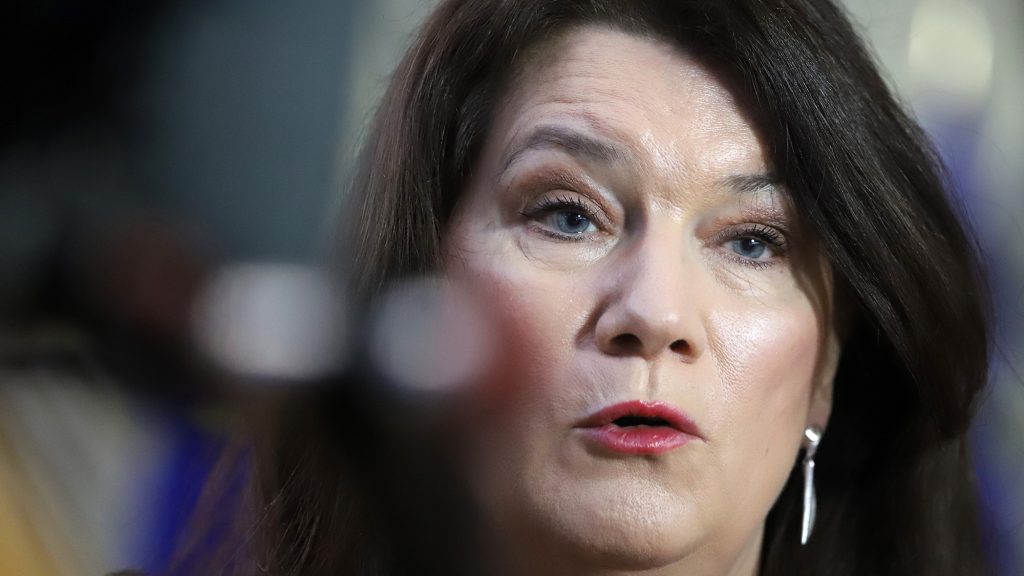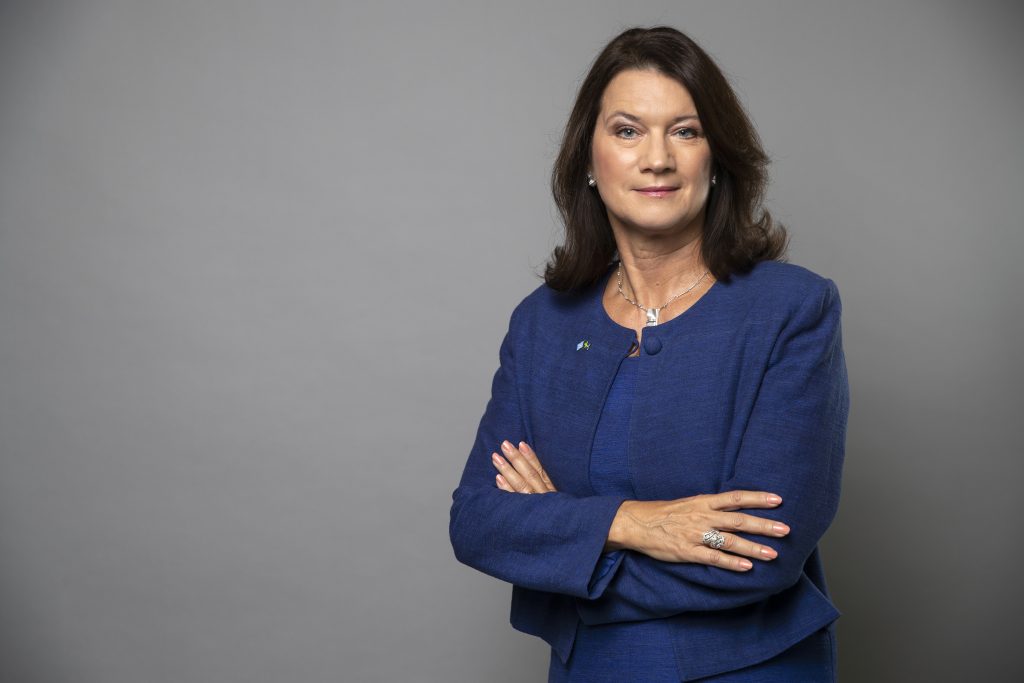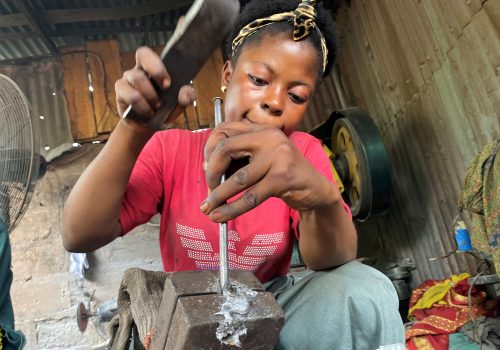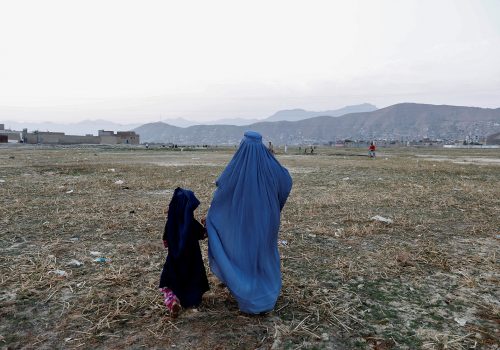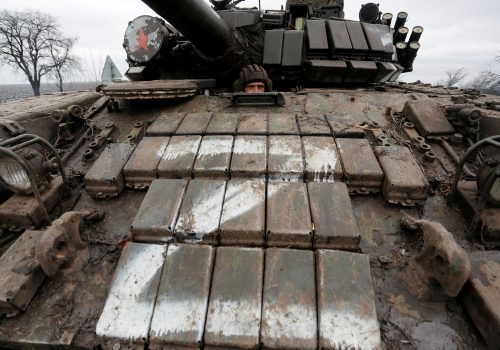Watch the full event
Swedish Foreign Minister Ann Linde wants to get “as many countries as possible” to adopt a feminist foreign policy—“but not if [they] only want to have a nice headline.” To truly improve circumstances for women and girls, they “really need to show that they are prepared to do something,” she said.
Speaking at an Atlantic Council Front Page event on March 8 marking International Women’s Day, Linde said the holiday serves not only as a celebration of women’s achievement but also as “a call to action” aimed at raising the prominence of women and girls in various foreign-policy issues.
She narrowed in on one such issue: Russia’s invasion of Ukraine. Explaining how women and girls “are the most vulnerable groups” and are “disproportionately affected by conflict and crisis,” Linde pointed in particular to the increased risk of sexual violence that Ukrainian women and girls face. Recent unconfirmed reports of sexual violence perpetrated by Russian soldiers, she explained, “are cause of great concern.”
Here are some of the takeaways from Linde’s wide-ranging remarks:
Supporting Ukrainian women
- Linde recounted having visited the contact line between the government-controlled and occupied areas of Eastern Ukraine. There, she said she met Ukrainian women with “strength and resilience,” who, for instance, couldn’t visit nearby parks with their children because of widespread mines. “Russia alone is responsible for the human suffering and tragic loss of life” that has resulted from its “unjustified aggression” against Ukraine, Linde said.
- But Russia’s aggression, Linde acknowledged, is being met by a “united and robust response in solidarity with Ukraine,” and the transatlantic cooperation behind it “has been as close as ever, enabling effective and swift decision-making.” Sweden is one of thirty-nine countries that last week asked the International Criminal Court prosecutor to open an investigation of crimes in Ukraine.
- The country has also “dramatically increased humanitarian aid” and is sending military gear to Ukraine, Linde said. She also outlined ways that Sweden typically takes gender into account when sending aid to countries impacted by conflict—including by helping fund civil-society organizations focused on women’s and girl’s rights and by deploying gender advisors and experts on sexual or gender-based violence to international peace operations.
‘Not only the right thing to do’
- Linde explained that this response to countries impacted by conflict is part of Sweden’s feminist foreign policy strategy, which requires countries to put their “gender glasses on” in everything they do. In 2014, it became the first country to adopt a foreign policy amplifying the experiences and perspectives of women, aimed at tearing down systems that suppress their access to rights and equal opportunities. Six countries have since followed. Still, Linde added, “we recognize that we all have a lot of work to do, both at home and abroad.”
- She explained that even today, “the daily lives of women and girls around the world [are] marked with bias, discrimination, and systematic subordination.” That includes recent setbacks from the pandemic (which she said has caused “an outright recession for women and girls with devastating long-term effects”), systematic attacks against gender equality, and the widening gender poverty gap.
- Employing a gender perspective in foreign policy is “not only the right thing to do,” Linde explained, but because it’s “a necessary precondition for modern society, for jobs, and for economic growth.” She cited cases in Nordic countries in which increases in female employment directly accounted for GDP per capita growth as much as 20 percent. “Equality, democracy, and economic development [go] hand-in-hand,” Linde said.
- Sweden hopes to achieve several key gains for women and girls in the future, including improved gender parity across institutions and representative bodies, as well as greater resources for advocacy groups. Linde said such changes will need to be “systematic” and “take place at a societal level” through new laws, policies, and protection systems in place.
Here’s where to start
- With so much to do to improve women’s and girl’s rights globally, Linde said Sweden is prioritizing specific areas such as worldwide economic empowerment for women, for which she pledged it would work with UN Women, partner countries, and non-governmental organizations on improving access to employment and expanding affordable childcare options. She added her country will fight for improved sexual and reproductive health and rights, especially since she has seen “backlash in many countries and in many multilateral fora” against addressing the issue.
- Another one of Linde’s priority areas is implementing the women, peace, and security agenda that strives to ensure that women are included in all aspects of peace processes around the world. To that aim, Linde—who was previously chairperson of the Organization for Security and Co-operation in Europe (OSCE)—appointed a new OSCE advisory group of experts on women, peace, and security in February 2021. Linde said the OSCE also sought to change perceptions of the gender dimension of security—which is often categorized as a “soft” issue against “hard” issues like military strategy—by fully incorporating it into a comprehensive approach to security.
- “We know that if there are more women involved [in conflict-mediation], there is more peace,” Linde said. “So it is important that you always insist on having women, for example, in all parts of the conflict cycle: before, during, and after conflict.”
Watch the full event
Further reading
Tue, Mar 8, 2022
Memo to the G7: Your economic stability goals won’t be achieved without women
New Atlanticist By Nicole Goldin
On this International Women's Day, the world's major economies should remember that investing in women's economic empowerment lifts up societies more broadly.
Wed, Mar 2, 2022
The United States must help Afghan women and girls—even if it requires partnership with China
New Atlanticist By
It’s time for the Biden administration to look beyond its competition with China and realize that sometimes cooperation makes sense, even with one’s adversaries.
Mon, Mar 7, 2022
Western weakness is enabling Russian war crimes in Ukraine
UkraineAlert By
The democratic world has loudly condemned Vladimir Putin's Ukrainian invasion but longstanding policies of Western weakness towards the Kremlin linger on and are now enabling Russian war crimes in Ukraine.
Image: Ann Linde, Sweden's foreign minister, speaks to the press before a meeting of European Union (EU) foreign ministers at the EU Council headquarters. Photograph by Valeria Mongelli/ Hans Lucas via Reuters.
